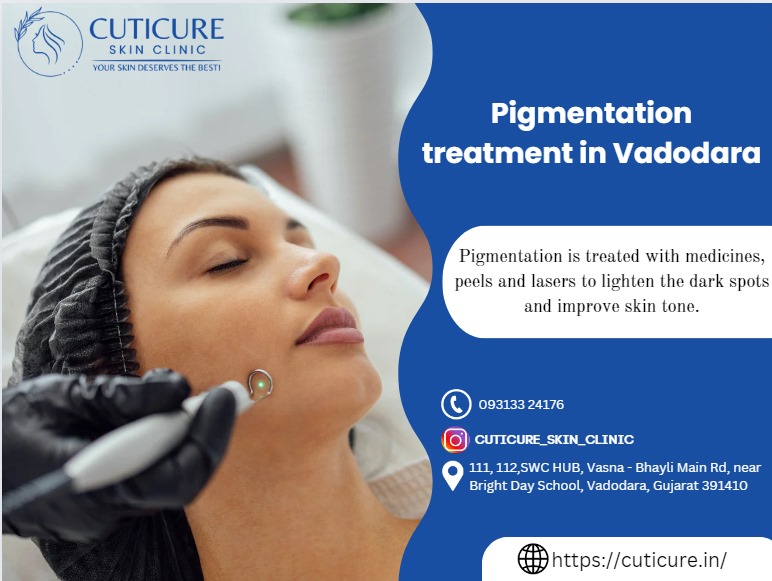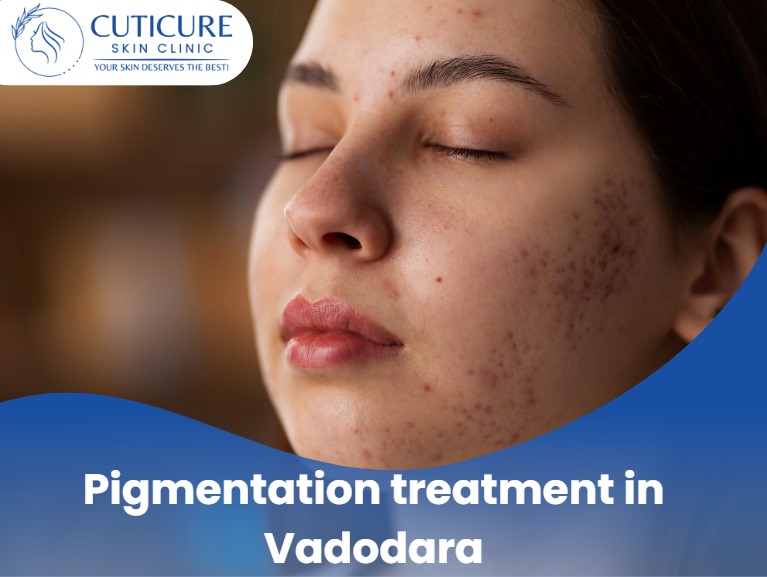Table of Contents
Transform Your Skin with the best Pigmentation Treatment in Vadodara
Introduction to Pigmentation Treatment In Vadodara
Pigmentation issues go beyond mere aesthetics; they also can considerably impact your vanity and self-belief. Whether you are coping with dark spots, melasma, or dull skin tone, it’s essential to apprehend the underlying reasons for pigmentation.
While sun exposure, hormonal adjustments, and genetics are common culprits, lifestyle can also contribute to pigmentation problems. To efficiently control those worries, it is vital to perceive the unique kind of pigmentation you’ve got.
The importance of professional consultation regarding skin issues
Attempting to diagnose and deal with pigmentation yourself can often lead to ineffective or dangerous side effects. That’s why it is essential to seek advice from a dermatologist who can offer a customized treatment plan tailored to your specific pores, skin kind, and pigmentation problem.
A qualified professional will use superior diagnostic tools to accurately decide the cause and form of your pigmentation, ensuring the best remedy options are offered.
In Vadodara, Dr Parth Radhani at Cuticure Skin Clinic is a renowned professional on this subject, turning in professional consultations and customized care plans that will help you reap radiant, and pigmentation free skin.
Discover Effective Pigmentation Treatments in Vadodara
Cuticure Skin Clinic gives various superior treatments for pigmentation that integrate conventional methods with brand-new technological improvements. These treatments are designed to deal with numerous styles of pigmentation problems and assist you to in achieving more even and radiant skin tone. Let’s discover the available treatments:
Chemical Peels
Chemical peels involve using diverse acids to exfoliate the skin, helping to put off dark spots. The form of peel used relies upon the severity of the pigmentation.
Laser Therapy
Laser treatments are tremendously powerful for deep pigmentation issues. They target melanin within the skin, breaking it down and helping obtain an even skin tone.
Topical medications
Dermatologists may prescribe topical treatments containing substances like hydroquinone, retinoids, or corticosteroids to reduce pigmentation.
Combination Treatments
In some instances, an aggregate of treatments can also yield first-rate outcomes. Your dermatologist will advocate the most suitable options based totally on your pores and skin type and the severity of your pigmentation.
It’s critical to word that consulting an expert dermatologist like Dr Parth Radhani at Cuticure Skin Clinic in Vadodara, is essential for a customized treatment plan tailored to your needs.
Dr Radhani is an expert on pigmentation treatments and can offer expert consultations and customized care plans to help you attain brighter and even-toned pores and skin.
Remember, every man or woman’s skin is unique, so it is crucial to visit a professional to decide the most appropriate remedy options for your unique pigmentation concerns.

Maintaining Your Skin’s Radiance After Pigmentation Treatment in Vadodara
To ensure that you maintain beautiful results, it’s vital to follow the right aftercare. Here are some easy recommendations to help you keep your skin looking satisfactory:
Sun Protection
Protecting your skin from the sun is vital, as UV rays can worsen pigmentation issues. Make sure to always wear sunscreen with at least SPF 30, even on cloudy days. Remember to reapply sunscreen every two hours when you’re exterior. Additionally, bear in mind carrying sun-shielding apparel, a hat, and shades for delivered defence in opposition to dangerous UV rays.
Gentle Skincare
After your pigmentation treatment, it is vital to apply mild and hydrating skincare merchandise to keep away from your skin. Look for merchandise that contains ingredients like hyaluronic acid and ceramides, as they help lock in moisture and sell skin health. Avoid the use of harsh exfoliants or abrasive scrubs which could potentially worsen pigmentation issues.
Regular Follow-ups
To ensure that your pigmentation treatment is on target and to make any essential adjustments, it is essential to agenda normal compliance with-up appointments along with your dermatologist.
This will permit your dermatologist, consisting of Dr. Parth Radhani at Cuticure Skin Clinic in Vadodara, to reveal your progress and address any worries or questions you may have. They also can make changes to your treatment plan if wanted, ensuring the most satisfactory possible outcome in your skin.
Healthy Lifestyle
Maintaining a healthful lifestyle can greatly contribute to the overall health and look of your skin. Make sure to consume a balanced weight-reduction plan, stay hydrated by means of drinking plenty of water, and prioritize getting enough sleep.
Additionally, incorporating strain management strategies like yoga or meditation into your routine can have a high-quality effect on your pores and skin’s fitness.
Remember, these aftercare recommendations are generalised. For personalized recommendations primarily based on your precise treatment and skin type, it is quality to consult with your dermatologist.
Dr Parth Radhani at Cuticure Skin Clinic is an expert in pigmentation remedies and can provide you with quality steerage to maintain your skin’s radiance after treatment.
By following those simple aftercare tips, you can help ensure that your pigmentation remedy yields long-lasting and fulfilling results. Enjoy your lovely, radiant skin!
Conclusion
Say goodbye to pigmentation issues with effective treatments at Cuticure Skin Clinic in Vadodara. Understanding the reasons and type of pigmentation is the first step in accomplishing clearer and brighter pores and skin. Seeking expert sessions and following a customized remedy plan are critical for achievement.
At Cuticure Skin Clinic, Dr Parth Radhani and his dedicated team are devoted to assisting patients in overcoming pigmentation issues with advanced treatments and personalized care. Take the first step closer to higher pores and skin fitness by booking a consultation.
Ready to transform your pores and skin? Look no further than Cuticure Skin Clinic, where expert care and modern technology come collectively. Dr Parth Radhani and his crew are here to help you reap the clean, radiant pores and skin you’ve always preferred.
Sure! Here are some frequently asked questions (FAQs) about pigmentation treatment along with their answers:
FAQs on Pigmentation Treatment In Vadodara
1. What is pigmentation?
Pigmentation refers to the coloring of the skin. It is caused by melanin, a pigment produced by melanocytes in the skin. Pigmentation issues arise when there is either an excess (hyperpigmentation) or a lack (hypopigmentation) of melanin production.
2. What causes hyperpigmentation?
Hyperpigmentation can be caused by various factors, including sun exposure, hormonal changes, inflammation, certain medications, and skin injuries. Conditions like melasma, age spots, and post-inflammatory hyperpigmentation also contribute to excess melanin production.
3. What are the common types of pigmentation treatments available?
Common pigmentation treatments include topical treatments (like hydroquinone, retinoids, and vitamin C), chemical peels, laser therapy, microdermabrasion, and cryotherapy. The choice of treatment depends on the type and severity of pigmentation.
4. What is laser therapy for pigmentation?
Laser therapy involves using focused light energy to target and break down pigment cells in the skin. This treatment is effective for various types of pigmentation, including age spots, sun spots, and melasma. Different types of lasers, such as Q-switched lasers and fractional lasers, are used depending on the condition.
5. Are pigmentation treatments safe?
Most pigmentation treatments are safe when performed by a qualified dermatologist or skincare professional. However, some treatments may cause side effects such as redness, irritation, and sensitivity. It is important to follow post-treatment care instructions and use sun protection to minimize risks.
6. How long does it take to see results from pigmentation treatments?
The time to see results varies depending on the type of treatment and the severity of the pigmentation. Topical treatments may take several weeks to months to show improvement, while laser therapy and chemical peels may provide faster results. Consistency and adherence to the treatment plan are key to achieving desired outcomes.
7. Can pigmentation come back after treatment?
Yes, pigmentation can return if the underlying causes are not addressed. For instance, continued sun exposure without proper protection can lead to the recurrence of hyperpigmentation. It is important to follow preventive measures, such as using sunscreen and avoiding known triggers, to maintain the results of pigmentation treatment.
8. Are there any home remedies for pigmentation?
Some home remedies, such as applying aloe vera, turmeric, lemon juice, or apple cider vinegar, are believed to help with pigmentation. However, their effectiveness varies, and they may not be suitable for everyone. It is advisable to consult with a dermatologist before trying home remedies.
9. Who is a good candidate for pigmentation treatment?
Individuals with hyperpigmentation issues such as age spots, melasma, sunspots, or post-inflammatory hyperpigmentation may benefit from pigmentation treatments. A dermatologist can evaluate the skin condition and recommend the most appropriate treatment based on the individual’s skin type and pigmentation severity.
10. How much do pigmentation treatments cost?
The cost of pigmentation treatments varies widely depending on the type of treatment, the number of sessions required, and the geographic location. Topical treatments may be less expensive, while laser therapy and chemical peels can be more costly. Consulting with a dermatologist can provide a better understanding of the potential costs involved.
11. Can pigmentation treatments be combined with other skincare treatments?
Yes, pigmentation treatments can often be combined with other skincare treatments to enhance results. For example, combining chemical peels with topical treatments can provide a more comprehensive approach to reducing pigmentation. However, it is essential to do this under the guidance of a skincare professional to avoid adverse reactions.


